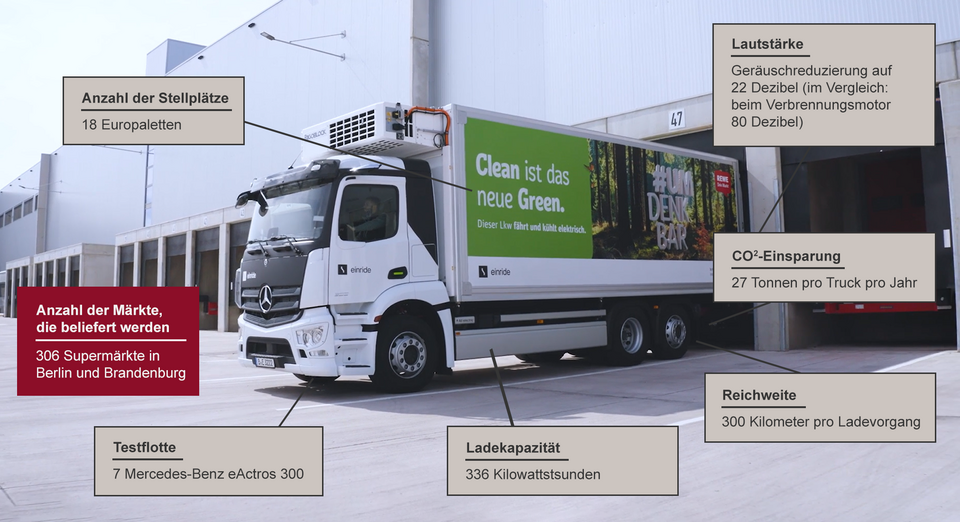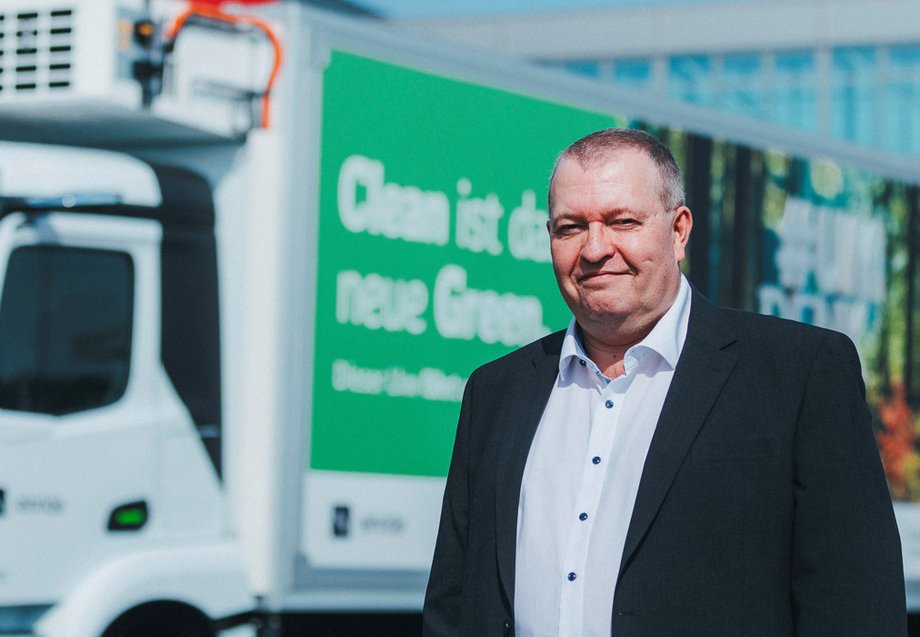Seven fully electric lorries are now supplying 306 REWE supermarkets in Berlin and Brandenburg. For us, this is an important next step towards more climate-friendly logistics. The new truck fleet not only saves hundreds of tonnes of CO², it is also significantly quieter than comparable trucks with combustion engines.
REWE is cooperating with the Swedish freight technology company Einride to supply its supermarkets in the capital region. A networked fleet of seven fully electric lorries delivers to around 306 supermarkets in Berlin and Brandenburg from the logistics centres in Oranienburg and Berlin-Mariendorf. REWE is thus taking a further step towards more climate-friendly logistics. "By using the seven electric trucks, we are saving up to 189 tonnes of CO² per year," emphasises Sven Wallisch, Head of Transport Logistics Region East. The company plans to purchase a further four electric lorries for its own fleet in Oranienburg this year.
Electrical expertise from Sweden
"We are delighted that more and more companies are moving in a climate-neutral direction. Together with Germany's second-largest food retailer, we can make a significant contribution to global carbon reduction," says Robert Ziegler, General Manager Europe at Einride. The international transport company is regarded as one of the leading providers of intelligent solutions for digital, electric and autonomous freight transport. Since its foundation in 2016, the Swedish company has helped to reduce its business partners' CO² emissions by up to 95 per cent compared to driving with diesel.
Up to 300 kilometres on quiet tyres
The Mercedes-Benz eActros 300 single-ride trucks used have a gross vehicle weight of 27 tonnes, 18 Euro pallet bays and a charging capacity of 336 kilowatt hours. The range is up to 300 kilometres with a full battery. Another plus point is the noticeable noise reduction of up to 22 decibels. By comparison, the noise level of vehicles with combustion engines is around 80 decibels. The trucks are refuelled directly at the logistics sites in Oranienburg and Berlin-Mariendorf at a rapid charging station equipped with seven charging points.
Each truck is equipped with the "S1R" turning assistant. This warns drivers of cyclists and pedestrians in the blind spot when turning right. For manoeuvres up to a turning speed of 20 kilometres per hour, the assistant initiates automated braking.

"Driving electromobility forward"
The integration of Einride's freight mobility service is based on a REWE company project on alternative drive systems in delivery transport. The food retailer is carrying out various tests on alternative drive systems this year. Among other things, process-related effects and consumption figures are being analysed. The results will form the basis for future fleet procurement decisions. As early as 2021, REWE took part in a feasibility study by the Fraunhofer ISI innovation institute on the use of e-trucks in urban logistics. According to Sven Wallisch, participating in the research project was very helpful and motivating. "The study has shown that the currently available ranges of battery-powered trucks are often already sufficient to cover the urban truck routes analysed in the study and almost half of the regional routes considered with electric trucks. With Einride, we have the right partner at our side to drive electric mobility forward."
This is Einride
Einride designs, develops and implements technologies for the future of the transport industry. With its intelligent platform Einride Saga, electric and autonomous vehicle fleets as well as charging and connectivity networks, Einride enables shippers to introduce sustainable and competitive transport solutions. Founded in 2016, the freight technology company was the first company in the world to deploy an autonomous electric vehicle on a public road in 2019 and the first company to receive authorisation to operate the vehicle on a public road in the USA in 2022.
Sven Wallisch, Head of Transport Logistics Region East, on the launch of the e-truck fleet in Berlin, technical progress and the opportunities offered by new technologies in delivery logistics.
 Sven Wallisch
one: Mr Wallisch, where exactly are the seven electric trucks in use and at what times of day?
Sven Wallisch
one: Mr Wallisch, where exactly are the seven electric trucks in use and at what times of day?
Sven Wallisch: The vehicles are deployed throughout the day in the distribution area of the Oranienburg and Berlin sites, particularly in the urban city centre of Berlin and the immediate surrounding area. The seven vehicles will become eleven by the end of the year.
one: The e-trucks are described as "fully electric". What exactly does that mean? In view of our feasibility study in 2017 and the pilot test with the e-truck in 2014, has there been any further development here?
Wallisch: The vehicles no longer carry any conventional energy sources. The vehicle itself, but also the peripheral devices, such as the cooling system, are fully electrically powered. They are therefore not hybrids. The feasibility study conducted with the Fraunhofer Institute for Innovation Research in 2021 played a key role in the conversion of the lorry fleet that has now been launched. The pilot test with the so-called eForce from 2014 also has an impact here, as this was our first step for all interfaces and stakeholders involved.
one: As we all know, technology is developing rapidly. What progress has the battery-electric truck drive made since 2014, for example in terms of noise level, range, charging time or charging volume?
Wallisch: We would be doing the eForce from 2014 an injustice by making a comparison now. The differences in technology over the last ten years are simply immense. In particular, the ranges and charging times of lorries have been transferred to practicality. "Speedchargers" and flexible battery capacities also enable use beyond local distribution. Every change in technology harbours risks, as damage and wear patterns can only be determined through prolonged use, but we do not see any greater risks than with the use of conventional vehicles. The reduction in noise emissions reflects technological developments. Today, lorries produce just 22 decibels, which is equivalent to the sound of breathing.
one: Will trucks replace combustion vehicles 100 per cent on their routes?
Wallisch: Yes, by using the eTrucks, we reduce the number of internal combustion lorries used 1:1.
one: What role is the issue of night deliveries currently playing with quiet delivery vehicles such as e-trucks?
Wallisch: We know that we are investing massively in the feasibility of "low-noise night logistics" with these vehicles and will also deploy the vehicles accordingly where it makes sense to do so
one: Are other alternative drive systems, such as hydrogen or natural gas, currently in use or being trialled? Do these still play a role at all?
Wallisch: Absolutely. We will always have to decide on a site-specific basis which energy source is preferred and which energy mix is used. LNG or CNG gas, hydrogen, electricity, eFuels or even energy sources that have hardly been researched to date will always be tested by us for their suitability in practice. We are aware of the supply mandate of our markets, as well as the upcoming energy transition in heavy goods transport.
one: Mr Wallisch, thank you very much for talking to us.
